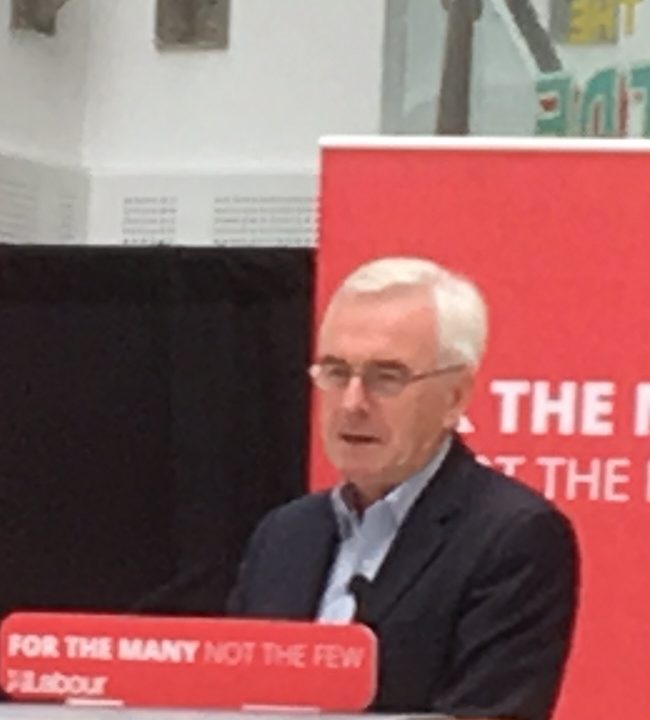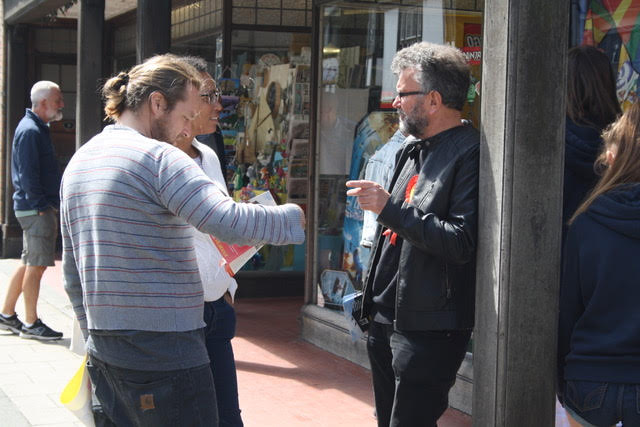Seaside towns such as Rye and Hastings are often thought of as the end of the (railway) line, but should also be thought of as the start of a journey, an audience of over 100 was told last week, so they cease to be some of the poorest parts of this country.
Community groups, local businesses, trade unions and Labour Party members had been invited to a four-hour workshop on the economy on Saturday July 21, and the Atrium at Sussex Coast College, by Hastings station, was packed with tables and people for a mix of speeches and discussion groups.
The event was hosted by Labour’s Shadow Chancellor of the Exchequer John McDonnell MP and kicked off by Labour’s Prospective Parliamentary candidate for the constituency of Hastings and Rye, Peter Chowney (shown above in Rye during the last General Election) who is Leader of Hastings Borough Council.
He drew attention to the severe poverty in parts of Hastings and Rye and the surrounding countryside, where he said unemployment was three times the regional average for the South East, with some parts having 16 years less life expectancy, he claimed, than their better-off neighbours.

Then McDonnell pointed out it was also a low-wage area and claimed a third of children living in poverty despite many of them living in a working household, and he said there was a need for proper investment which boosted productivity and improved management.
A living wage was useless however without the hours, and Shadow Chief Secretary to the Treasury Peter Dowd MP said people wanted more and better work, and wanted more public investment “as austerity wasn’t working”.
Each table of people was then urged to be radical and think about their vision of the future, but a frequent issue was divisions in the community between “locals” and “DFLs” – those Down From London, for a day, week, or the rest of their lives – and local issues, such as dogs and parking.
A recurring theme was “learning from what works and what doesn’t” and “thinking local”. Transport links are poor and heavy industry is not suddenly going to come to the area – though some light, high-value industry has – and Hastings’ products are in outer space.
A speaker from Preston talked about what they had done to encourage local co-operatives and look for investment from bodies outside The City (of London) as the major banks were speculatively investing, which had gone badly wrong in the late 80s and again more recently, causing “austerity measures”.
A focus emerged on what could be done locally, and is being done, and this included new locally supplied high-standard flat-pack housing to meet local needs, and the expansion of wind and solar energy at a very local level since Hastings can be very windy and Camber was certainly sunny.
Various parts of the public sector also needed to work together more closely both to improve services and do more joint procurement, and to do this locally in particular – and this is already happening to some extent.
Councils could do more to support and encourage start-up enterprises and should be encouraging people to buy local and keep their money local. The “Bristol Pound” was given as an example of one such initiative (a local currency spent locally), and examples can be found in Rye such as the Farmers Market on Strand Quayside on Wednesday and the Country Market in the Community Centre on Fridays.
Summing up, John McDonnell said a real dialogue needs to start within the community, and Hastings and Rye were not towns at “the end of the line”, but towns being held back – and a lot could, and would, have to be implemented at grass roots level.
Photos: Rye News Library and Gerard Reilly




You seem to really hate people who have moved to Rye from London to live. In the introduction to this article on the home page, you imply that DFLs dont care about local people who may be enduring poverty.
The article itself doesn’t support that statement. It does mention divisions between locals and DFLs which I accept is potentially a real issue, especially when thinking about access to housing say. But I think its very nasty and misleading to suggest that DFLs couldnt give a fig about people living in poverty in Rye.
Why do you make such value judgements? Do you have any evidence to support them?